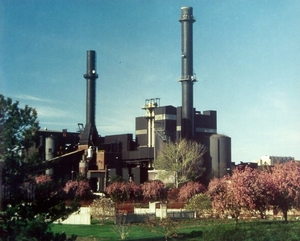Jan 12 2011
Iowa State University has recently concluded a four month long test burn of biomass. This development will help the university consider the possibility of installing a biomass plant at the university. It will soon discuss this issue with the state Department of Natural Resources.
 Bio energy plant
Bio energy plant
Working closely with NextGen Biofuels, the university has been burning biomass at its coal-fired combined-heat-and-power plant in the summer of 2010. Both wood pellets and chips were burnt during the test burns that began at 5% biomass and rose to 10 and 15%. This information was revealed by Rob Ravlin, NextGen president. Wood pellets were test burnt at a 20% blend, raising hopes that wood waste could effectively replace coal. The changeover would not need any further capital investment.
The tests used biomass having a Btu value of 7,800 per pound with a blend of western Kentucky and southern Illinois coal at 11,800 Btu per pound. They revealed sulfur dioxide reduction of about 11.5%. Carbon dioxide revealed a reduction of .5%; while reduction in particulate matter stood at 24.2%m and in carbon monoxide parts per million at 6/5%. Since biomass is more volatile than coal, nitrogen oxide increased by 3%.
The plant will use about15% biomass, a 2-inch minus wood chips instead of pellets because chips are cheaper than pellets. But the chips will have to be precisely sized. The college hopes to be able to either replace some of the biomass currently being imported, or eventually to eliminate imports completely.